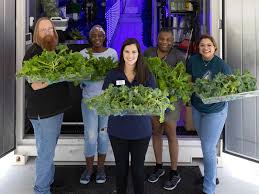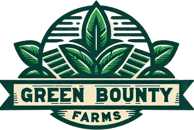Freshness on Demand: How Container Farms are Changing Urban Consumers’ Expectations
Freshness on Demand: How Container Farms are Changing Urban Consumers’ Expectations
FARMING
Christopher Hebb
6/10/20244 min read


The Rise of Urban Agriculture
In recent years, urban agriculture has gained significant traction as a response to the rising demand for fresh produce in metropolitan areas. With the world's population increasingly gravitating towards cities, the challenges faced by traditional agriculture—including long transportation times and limited access to fresh foods—have raised concerns about food security. Container farms have emerged as a promising solution within this burgeoning sector, providing innovative methods to address the shortcomings of conventional farming.
Container farms utilize repurposed shipping containers fitted with advanced technologies to create controlled environments for growing crops. This method is particularly space-efficient, allowing urban dwellers to cultivate high-yield produce in relatively small areas. Unlike traditional farms that require extensive land, container farms can be established on rooftops, vacant lots, or any underutilized space, significantly integrating food production into urban landscapes. As cities become more densely populated, container farming represents a sustainable alternative that aligns with the urban lifestyle.
Moreover, technological advancements play a pivotal role in the success of container farms. With the integration of hydroponic and aeroponic systems, these farms enable the growth of crops without soil, reducing water usage and eliminating pesticides. Such innovations not only increase the efficiency of food production but also contribute to environmental sustainability, a growing concern among urban consumers. As cities strive for greener solutions, container farms fit seamlessly within these initiatives.
Ultimately, urban consumers benefit from increased access to locally-sourced produce, which not only promotes healthier eating habits but also fosters a sense of community. By bridging the gap between food production and urban residents, container farms exemplify the future of food systems in cities, reshaping expectations and delivering fresh produce as a viable and essential resource.
Meeting Consumer Demand for Freshness and Traceability
In recent years, consumer expectations surrounding food freshness and transparency have evolved significantly. The 'farm-to-table' concept has gained traction, emphasizing the critical need for fresh produce that is readily available and ethically sourced. Container farms, which utilize innovative farming techniques in urban settings, have emerged as a solution that aligns with these consumer demands. By growing food in close proximity to urban markets, these farms ensure that the time between harvest and consumption is minimal, thus preserving the freshness of the produce.
Container farms leverage technology to enhance the traceability of food, an important aspect for modern consumers who value accountability in their food choices. Many of these farms implement digital tracking systems that allow consumers to access information about the origins of their food. This technology offers insights into the farming practices employed, the journey of the produce from the farm to the consumer, and the overall environmental impact of the production process. This level of transparency fosters trust between producers and consumers, meeting the rising demand for ethical food sourcing.
The ability to provide fresh produce that is not only harvested locally but can also be traced back to its source is paramount in today's market. Consumers increasingly prioritize quality and sustainability, seeking out food options that fulfill their expectations for health and environmental responsibility. Container farms address this need by incorporating sustainable practices and minimizing supply chain complexity. As such, they effectively meet consumer demand for freshness and traceability, positioning themselves as leaders in the urban agricultural landscape. This shift towards more transparent sourcing not only caters to individual preferences but also promotes a broader awareness of food systems and their impact on the environment.
Sustainability and Environmental Impact of Container Farms
The emergence of container farms has significantly transformed the landscape of urban agriculture, presenting various sustainable practices designed to minimize environmental impact. These innovative farms utilize advanced methods such as hydroponics and vertical farming to optimize the growth of crops while conserving essential natural resources. Hydroponic systems allow plants to grow in nutrient-rich water without soil, greatly reducing the need for land, while vertical farming techniques increase the cultivation area by utilizing vertical space, allowing for maximum yield in limited urban environments.
Container farms are particularly noteworthy for their efficient use of water. Traditional agriculture is often prone to excessive water consumption, but the closed-loop systems employed in container farming significantly decrease water usage, utilizing up to 90% less water than conventional farming. This reliance on modern farming techniques not only conserves a vital resource but also ensures a consistent supply of fresh produce to urban consumers, who increasingly express concern about the environmental impacts of their food choices.
Consumer interest in sustainability is evident, influencing purchasing decisions and encouraging individuals to choose products linked to environmentally friendly practices. As awareness of sustainability continues to grow, container farms serve not only as a solution to food scarcity but also as a model for responsible and eco-conscious consumption.
Future Trends: The Evolution of Consumer Expectations
As the global urban population continues to grow, the expectations surrounding fresh produce are evolving at an unprecedented rate. Container farming, a modern agricultural technique, is emerging as a critical solution to meet these expectations. One of the most significant trends shaping the future of consumer expectations is the rising demand for fresh, local, and sustainably produced food. Consumers are becoming more aware of the environmental impact of their food choices, leading to a preference for organic and non-GMO produce. Container farms are strategically positioned to fulfill this demand, as they can be set up in urban areas, allowing for shorter supply chains and fresher products.
Technological advancements will play a crucial role in enhancing the efficiency and output of container farms. Innovations in automated systems, such as climate control, nutrient delivery, and data analytics, will optimize growing conditions, enabling producers to yield high-quality crops consistently. Additionally, integration of artificial intelligence and machine learning can help farmers predict trends and consumer preferences, ensuring that the fresh produce available is aligned with market demands. As these technologies continue to develop, we can expect container farms to not only increase their production capabilities but also enhance the overall quality of their offerings.
Moreover, the potential for scalability presents an exciting opportunity for container farming to influence food security in urban areas. As urban communities face challenges such as population density and dwindling agricultural land, container farms can easily be expanded or replicated, providing consistent access to fresh produce. This adaptability will be vital as consumers increasingly seek variety and availability year-round. The convergence of evolving consumer preferences, technological innovation, and urban agricultural advancements positions container farms to not only satisfy current demands for fresh produce but also to shape the future landscape of urban food systems.
© 2025. All rights reserved.







